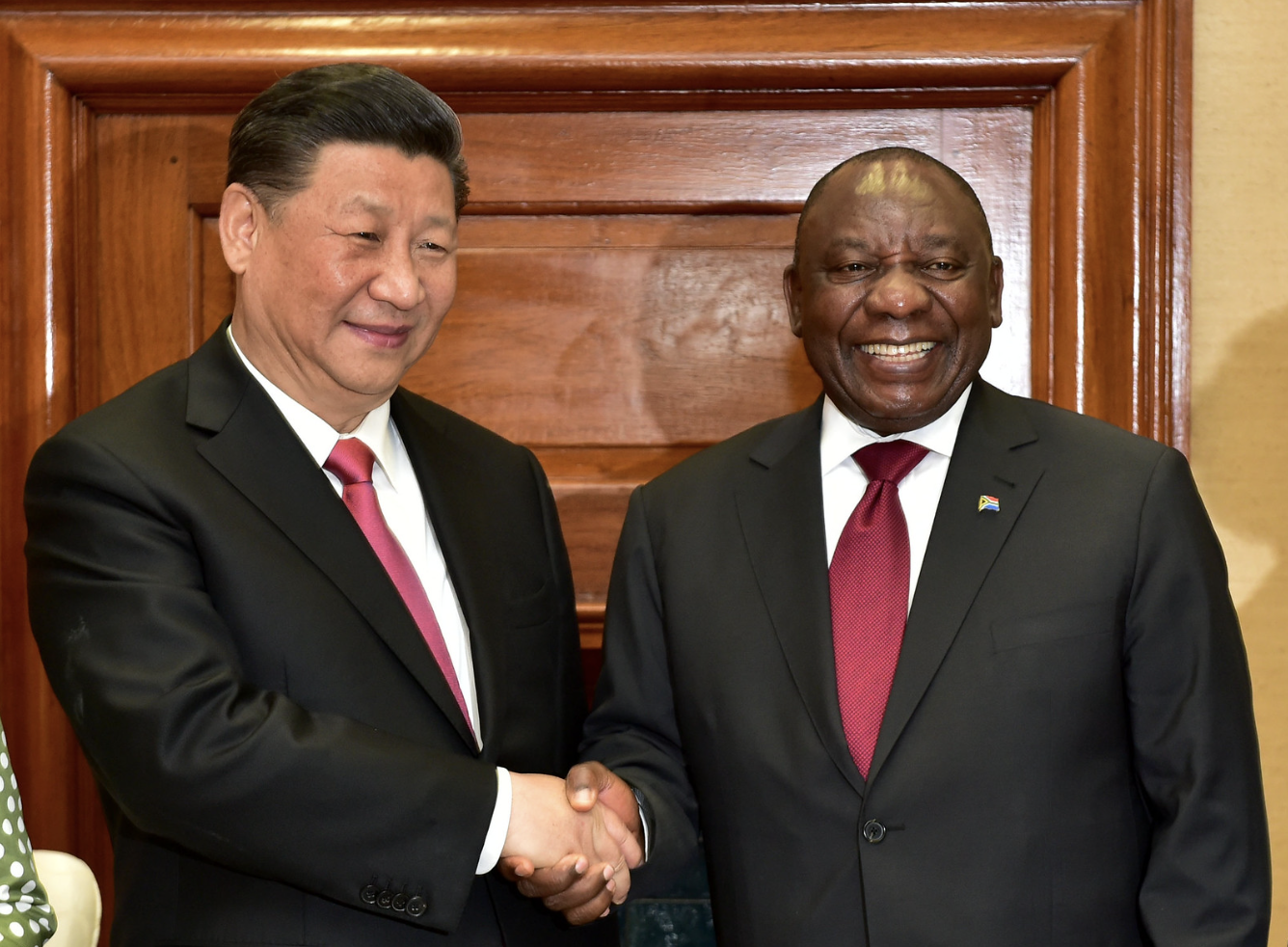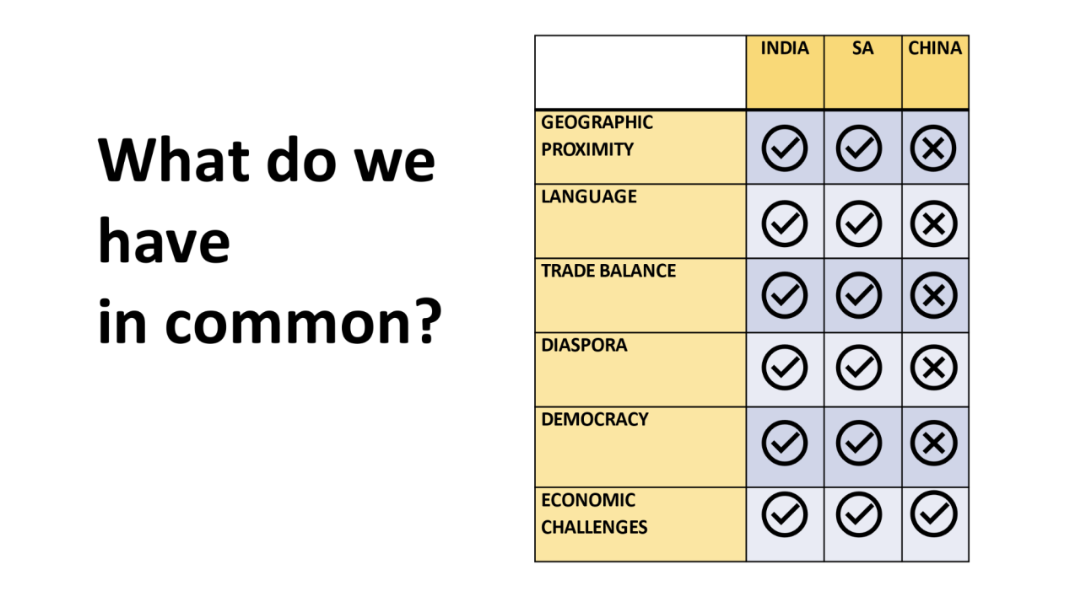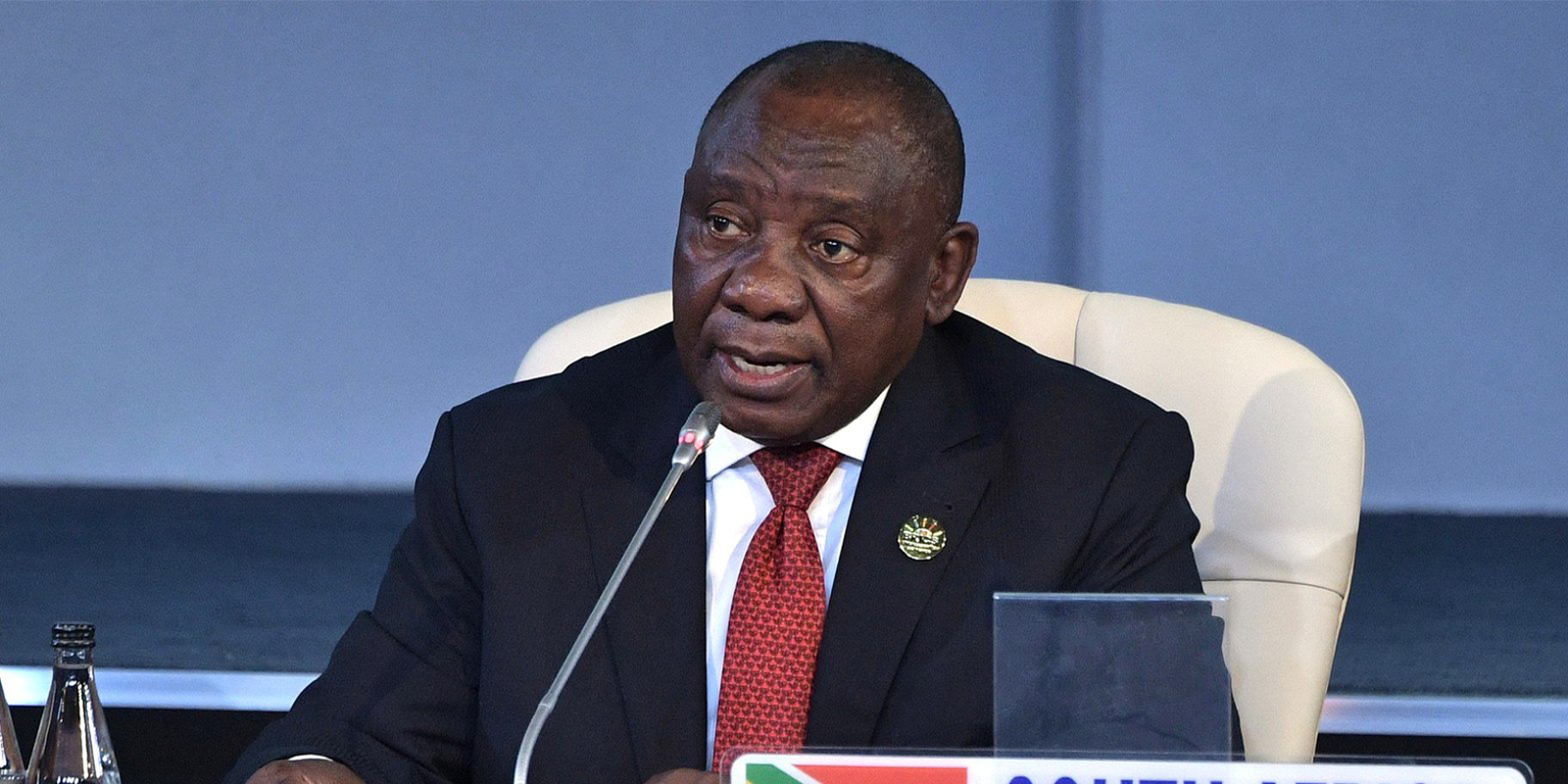News
South Africa’s Strange Obsession with China is Proof That it’s a Cheap Date
South Africa has a lot more in common with India than China, but the ANC government is tripping over itself to hook up with the latter – which goes to show that give it a bit of attention, and it stands for nothing and falls for everything.

Research Director, The Brenthurst Foundation

Director, The Brenthurst Foundation

Imagine two countries. The first country is closer by, is a democracy, has many people speaking the same language, has a successful, booming economy and its largest expatriate population lives on your shores. In addition, you export more to this country than you import from it.
The second country is many time zones away, is increasingly autocratic, speaks a completely different language and has a struggling economy that has seen better days. You import more from this country than you export to it.
Now ask yourself why your country is obsessed with building relations with the second country and has a grudging relationship with the first country that it shares so much with.
This is the story of South Africa, India and China. The truth is we have a lot more in common with India than China, as this table shows:

Defenders of South Africa’s fawning over China argue that it is the world’s second-largest economy and a large consumer of South African resources. The argument also goes that South Africa, which is not worthy of geopolitical attention, gets a lot of it from China, and this raises South Africa’s global standing.
While it is true that South Africa enjoys attention beyond its economic or security muscle because of its association with China, it is naïve to believe that China only buys South African resources because they are mined in a friendly country. China is a ruthless seeker of economic value and will source commodities at the best price from wherever it can in the world. China imports copper, fuels and countless other minerals and machinery from the US even though this relationship is now as strained as it has been over the last 50 years.
China, it is held, is the leader of something called “the Global South”, a group of countries that supposedly want to be “non-aligned”. This “Global South” is contrasted with “the West”, which is resented because of its economic dominance and what is seen as interference in the domestic affairs of countries with which it disagrees.
Speaking at the BRICS Business Forum on Tuesday, China’s President Xi Jinping summed it up:
“Our world today has become a community with a shared future, in which we all share a huge stake of survival. What people in various countries long for is definitely not a new Cold War or a small exclusive bloc; what they want is an open, inclusive, clean and beautiful world that enjoys enduring peace, universal security and common prosperity. Such is the logic of historical advance and the trend of our times.”
Does South Africa really believe this spin? For one thing, China is actively involved in fuelling the “new Cold War” with its fighter jets buzzing the Taiwan Strait and its support for Russia in its dispute with Ukraine. Presumably, these activities are consistent with striving for a “beautiful world that enjoys enduring peace”.
The same could be said about how China treats its minorities. Ask any Uighur or Tibetan. Presumably, this policy is not consistent with the values of non-racialism to which the ANC once subscribed.
South Africa knows that China’s real ambition is to build a global diplomatic and trade architecture that will support its geopolitical objectives in Southeast Asia as it begins to play outside the rules to extend its footprint in Taiwan and elsewhere.
Things are going to get rough, and China will need friends when it finally fulfils its own promise to reunite Taiwan with the motherland.
You could still make the argument in favour of non-alignment, but true non-alignment means not choosing China or any of the other global power brokers.
This brings us back to the baffling question of why South Africa prefers China to India, with which it shares so much.
The answer lies in the way the ANC has shifted South Africa’s foreign policy footing to better suit its growing identity as a party representing elite extraction more than grassroots democracy.
When Nelson Mandela, on the eve of becoming president, outlined South Africa’s foreign policy approach in a now-famous article in the journal Foreign Affairs, he said:
“The pillars upon which our foreign policy will rest are the following beliefs:
- That issues of human rights are central to international relations and an understanding that they extend beyond the political, embracing the economic, social and environmental;
- That just and lasting solutions to the problems of humankind can only come through the promotion of democracy worldwide.”
Outlining South Africa’s foreign policy approach on the eve of this month’s BRICS Summit, President Ramphosa said: “South Africa’s approach to foreign relations is to seek increased collaboration, to secure greater trade opportunities and increased investment and to work closely with partners across the globe to entrench peace and democracy.”
The promotion of democracy worldwide now seems an afterthought, not least in the case of South Africa’s northern neighbour Zimbabwe.

The shift from a principled to a transactional stance can clearly be seen. More than that, the pledge to work to entrench democracy is being approached unenthusiastically. Why else would South Africa welcome Saudi Arabia, Iran and the UAE into the BRICS fold? Is there a plan to craftily persuade Iran to adopt an open democratic constitution that does not discriminate against women? Will it be asking Saudi Arabia to abandon its monarchy in favour of an elected legislature?
India, the world’s most populous democracy, does not excite the South African government with its chaotic, vibrant public space. Instead, it appears hypnotised by China’s ordered, state-led government, which controls civil society and does not bother with trivia like public debate and criticism. There, a toothless commentariat either approves of the government’s every action or it is re-educated until it does.
It is as hypnotised by the Russian model where a powerful political elite, orbited by fawning business, and a state-controlled media, makes a large pile of money from rents.
South Africa might be a democracy in name, but when its president is found with US dollars (curiously not yuan or roubles) stuffed in his couch or when allegations of shady arms deals with Russia are made, independent institutions conduct inquiries behind closed doors with unnamed witnesses and release redacted findings which find no blame.
When BRICS rolled into town, the local commentariat, with one or two notable exceptions, flung itself into starry-eyed sycophancy and accepted the bona fides of rogue states in the glorious pursuit of a “new world order”, complete with a new currency to stuff in the couches.
South Africa has proved that it is a cheap date. Give it a little attention, and it stands for nothing and falls for everything. Much smarter would be to live up to the claim of non-alignment by pushing back against anti-democratic excesses regardless of who commits them, unless the ANC itself is eyeing that path jealously.
Not only is the formation of a cohesive bloc of states exclusive from the West outside of institutional memory, but it is curious what this group stands for, other than being outside of the West.
Next time (in 11 years with the added members), let’s make sure that India, with which we share so much, gets the star treatment.
This article originally appeared in the Daily Maverick
Photo: GovernmentZA Flickr

